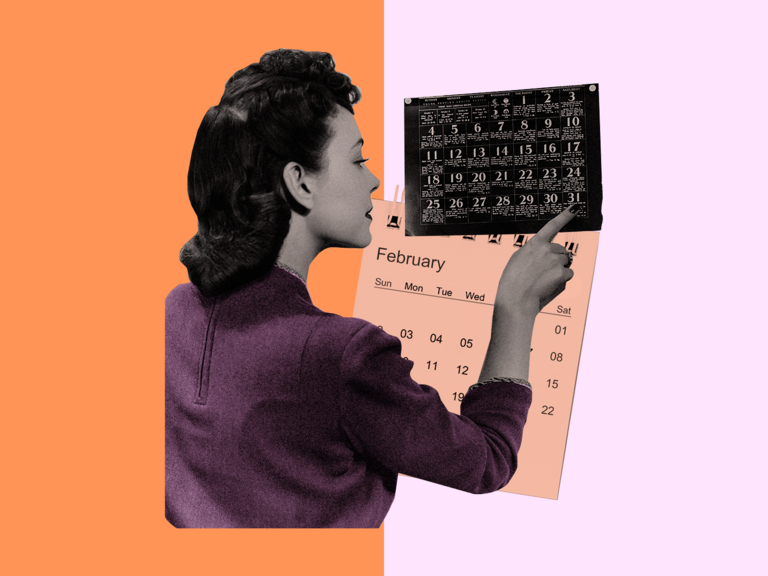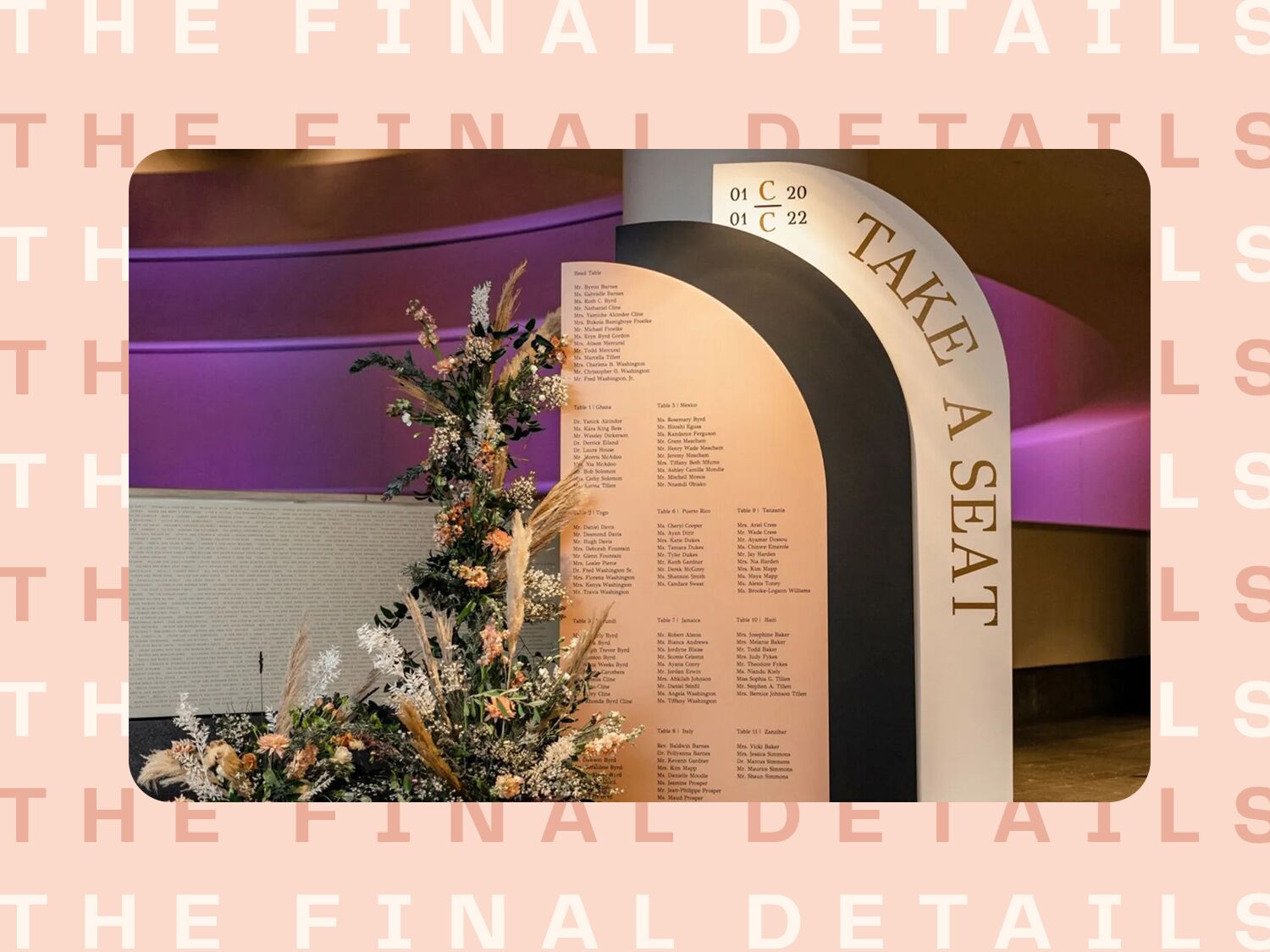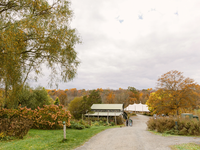Get Your Calendar Ready: Here's How to Pick a Wedding Date

Take a deep breath and let your shoulders relax. If you've found your way here, you've probably been peppered with the "when's the wedding?" question approximately 6,000 times already, starting on the day you got engaged. Determining how to pick a wedding date is one of the very first planning tasks to tackle, and finally marking your calendar will be the catalyst for everything to come. Do note: The phrase "setting a wedding date" is typically code for booking a wedding venue (you need a defined place to say "I do" before you start telling people when to show up). Though, it's good to do a little brainstorming beforehand on meaningful dates in your relationship or which wedding season you prefer to help narrow down your venue options. Ready to learn how to choose a wedding date? Grab a snack and follow the steps below. By the time you're done reading, you'll have a firm idea of when you'd like to wed.
In this article: When Should You Pick a Wedding Date? | Do You Need to Choose a Date or Venue First? | How to Pick a Wedding Date Step-by-Step | What to Do After Setting a Wedding Date
For Deets on Specific Wedding Dates: Lucky Wedding Dates | Wedding Dates to Avoid | Most Popular Wedding Dates | Wedding Date Numerology Calculator
When Should You Pick a Wedding Date?
The process of how to pick a wedding date is different for each couple, but setting a wedding date at least one year out is best practice. According to the The Knot 2025 Real Weddings Study, the average engagement length is 15 months, and more than half of couples are engaged for over one year.If you and your partner plan on following a similar timeline, you can use those first three months to focus on setting your wedding budget and brush up on what to include on your wedding venue booking checklist. Then, aim to pick your wedding date 12 months ahead. This will give you plenty of time to book your vendors and soak up the planning process.
Remember, there are no wrong answers here. If you plan a wedding date six months from your engagement, it'll be a full-on sprint to the finish line, but you will find a way to get it done with enough time, and some people thrive under pressure. If you'd like some more time to save up for your wedding or are waiting for other milestones to take place (like completing a graduate degree, moving to the same city or helping a sibling get married) before you get too into the wedding planning weeds, a long engagement could be a better choice. In that case, we still recommend choosing a wedding date on the earlier side if you can anticipate when a good time to tie the knot would be, even if it's, say, three years out. That way, you can slowly chip away at your wedding to-do list over time and you won't be met with long wait times for preferred venues and vendor availability.
Do You Need to Choose a Date or Venue First?
While picking a wedding date should be one of the first steps in the planning process, you can go about it in multiple ways. Some couples choose a date that's special to them first, and only consider venues that are available on that particular date. Others are more flexible, finding a venue that they love first and then selecting their date based on the venue's availability. There's truly no right or wrong method when it comes to how to choose a wedding date (we promise), but going with the latter option and researching wedding venues near you first will help you get your wedding date booked faster, if that's a priority for you, so long as you're not precious or picky about your wedding date.
How to Pick a Wedding Date Step-by-Step
So, how do you choose a wedding date? Again, there's no wrong way. However, we're partial to the tried-and-true, wedding-editor-approved steps below. This method will help you consider your calendar from every possible angle so you can move forward in the planning process with confidence and a calm energy. Just think of it loosely as a "how to pick a wedding date" quiz.
1. Identify Any Meanful Dates
How romantic would it be to marry on the anniversary of your first date, the day you became an official couple or on your grandparents' wedding date? Make a list of any dates that are meaningful to your relationship that you might like to say "I do" on in the future. They could be anniversaries as mentioned above, but also days that celebrate a beloved shared interest. For example, Star Wars-loving pairs might choose to wed on May 4th, as it's been deemed "Star Wars day." (Don't forget to tell your guests about any significance of your wedding timing in your ceremony programs.) You don't have to use these dates, but they're nice to be aware of if, for example, you find yourself caught between two available dates at your venue. Then, you can select the one with special significance.
If you aren't married (get it?) to any specific dates, move on to the next step. Otherwise, do note that you may be unable to marry on the date you want—that special date could fall on a Monday (which is usually not a day couples are excited about) or the venue you love may be booked—but you can probably get pretty close.
2. Use Your Budget to Narrow Down Dates
Yes, your wedding date and wedding budget don't seem connected off the bat, but let us explain: The higher your budget, the more flexibility you'll have when it comes to a wedding date, as slots during peak wedding season or much-desired weekend days will always be more expensive. Though, you don't have to have every dollar and cent of your wedding budget allocated at this point (though, major props if you do), but you should have a general idea of your desired spending level as you explore wedding date ideas.
If you're looking to save on your wedding, choose a date in the off-season, where you're more likely to get discounted prices and a broader selection of venues and vendors. The cheapest month to get married is one between November and April, as this is typically considered the off season, with the exception of a few specialty dates like Valentine's Day. Days of the week also matter: Saturday nights carry the heftiest price tag, but don't sleep on weekday weddings, especially if the bulk of your guests are local. Plus, you'll have a wider selection of available venues and vendors at your fingertips at lower prices.



3. Select a Season With Your Desired Weather
If you have some flexibility with your wedding date, we recommend thinking of the process of how to find a wedding date less in terms of days and weeks and more in terms of seasons. Settle on one or more seasons you would feel happy to get married in by considering each in terms of the weather of your wedding location during that time and the mood evoked by each season. If you're dying to get married alfresco, then you'll want to choose a season when clear skies and mild weather is most likely.
You might also think about your desired wedding vibe and potential wedding color palettes, and pick your season that way. Want free-spirited, fun, tropical-inspired cocktails and a sun-dappled ceremony? Stick with a summer wedding. Dreaming of opulence, snowfall and holiday sparkle? Try a winter wedding. Rich colors, nostalgia and mulled apple cider are perfect for a fall wedding, and a spring wedding is probably your thing if pastels and a daffodil bouquet sound like your bag. Again, you can be open to marrying in multiple seasons, it's just helpful to know what you like and don't like to narrow your options.
4. Check In With VIP Guests
If you have limited preferences, you may want to ask your nearest and dearest about date conflicts and plan accordingly. Be forewarned that this is a slippery slope if you ask anyone outside your essential circle of parents, siblings and honor attendants. We're talking the top-tier, wouldn't-get-married-without-them variety of loved ones. Keep it simple and don't budge once the date is set.
5. Determine Any No-Go Dates
There are definitely dates you don't want to schedule your wedding on. Marrying too close to certain holidays like Thanksgiving or Christmas could throw a wrench in many guests' longstanding travel plans. The weekend before tax day is not the best time to tie the knot—especially if one of you is an accountant or tax attorney. You also probably have your own crunch time at work, so don't marry then either. You'll either be stressed or find it difficult to take off for your honeymoon. Also, your religion may dictate some times of year, or even days of the week, that are off-limits.
Additionally, be sure to check the calendar to learn when major sporting events, graduations, festivals and other events are taking place in your chosen wedding location (the local Chamber of Commerce may be able to help you with this). Big events may mean sold-out hotels, high airfares and heavy traffic—not what you'll want to deal with on your wedding weekend. And if you're hosting a destination wedding, consult a local wedding planner to ensure that you're taking local events and customs into account when picking your date.
6. Think Through Lucky Wedding Days and Holidays
Are you a little superstitious or do you want to honor your religious or cultural background by choosing a lucky date for your wedding? We get it. There's nothing wrong with making sure the planets align on your special day, so looking into what days of the year are auspicious according to astrology and numerology as well as in various religions and cultures to guide you. While you're thinking of magical wedding date options, you should also consider if there are any holidays you would be excited to embrace on your wedding. If you've always wanted a Christmas tree at your wedding, or you'd love a heart-covered wedding cake, it sounds like you're a holiday wedding couple. A plus: Some holidays fall on long weekends, which might make it easier for out-of-town guests to attend. Though as aforementioned, selecting certain holidays can also potentially create conflict for some guests.
7. Consider When (and Where) You Hope to Honeymoon
Traditionally, couples would get whisked away to the airport right after the wedding reception to embark on their honeymoon the very next day. If you're planning on going this route, you might also want to consider the season of your honeymoon location as you hash out how to pick your wedding date. Likewise, you should keep a similar mindset if you're set on honeymooning a month or two months after your wedding.
8. Search for Venues With Your Findings In Mind
Now that you have a few dates in mind, you can start researching wedding venues. The first query on your list of questions to ask wedding venues should be about their availability. (For example, you could say "We're hoping to get married in May of 2027, and are particularly targeting these dates. Do you have any availability during this time?") If a venue is completely booked during your chosen season or workable dates, you won't want to move forward. However, if you fall in love with a particular venue, you might want to take another look at the calendar to see if there are dates that work for both parties. As we've discussed, flexibility can be key here, so don't discount weekdays or off-season dates.
What to Do After Setting a Wedding Date
You've mastered the process of how to set a wedding date (woooo!). The first thing you should do next is give yourself a pat on the back (and maybe even pick up a little treat). If you haven't committed to a venue on your journey of how to choose your wedding date, look around on The Knot Vendor Marketplace for a setting that suits you. You can get in touch with venues right on the platform, indicating your preferred wedding date so there's no confusion. (You can also explain that you're flexible and that you'd like to see their availability for a certain season or year.) You don't have to commit, just put some feelers out using this handy wedding vendor inquiry template.
Once you've booked your venue, you can finally start spreading the word about your date. One of the easiest ways to do that is by creating a wedding website, where you can display your date and a wedding countdown timer for your guests to easily access. To keep track of what's next up on the docket, download The Knot app to check off every mini wedding planning milestone as you accomplish it.




















